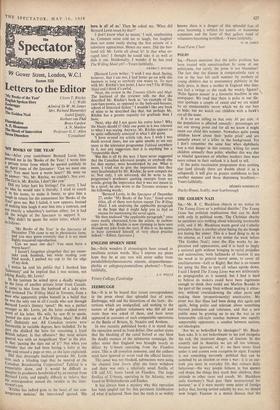POLIO
SIR,—Pharos mentions that the polio problem has been treated with sensationalism by some of our politicians, but surely the press is not blameless?
The fact that the disease is comparatively rare is lost in the fear felt each summer by mothers of young children due to unnecessary publicity in the daily press. Is there a mother in England who does not feel a twinge as she reads the weekly figures? • 'Polio figures mount' is a favourite headline in one newspaper. We read that there is polio in our dis- trict (perhaps a couple of cases) and we are seized by an unreasonable terror which we do our best to hide; but we watch our children with a hawk's eye all the sank.
It is no use telling us that only .01 per cent. of the population is affected annually : percentages are not our strong point and for all we know it might mean our child this summer. Nowadays quite young children know( about their 'polio prick' and are uneasily aware of a killer in the background, Yet I don't remember the same fear when diphtheria was a. real danger in this country, killing far more children annually than polio; whether this was due to blissful ignorance or whether mothers then were more robust in their outlook it is hard to tell.
If the polio vaccination programme does nothing else (and already there are doubts about it as a safeguard), it will give us greater confidence to face another summer and those depressing headlines.— Yours faithfully.
ntsuttE if AM ERSLEY
Duchy House, Seal by, near Scarborough


































 Previous page
Previous page